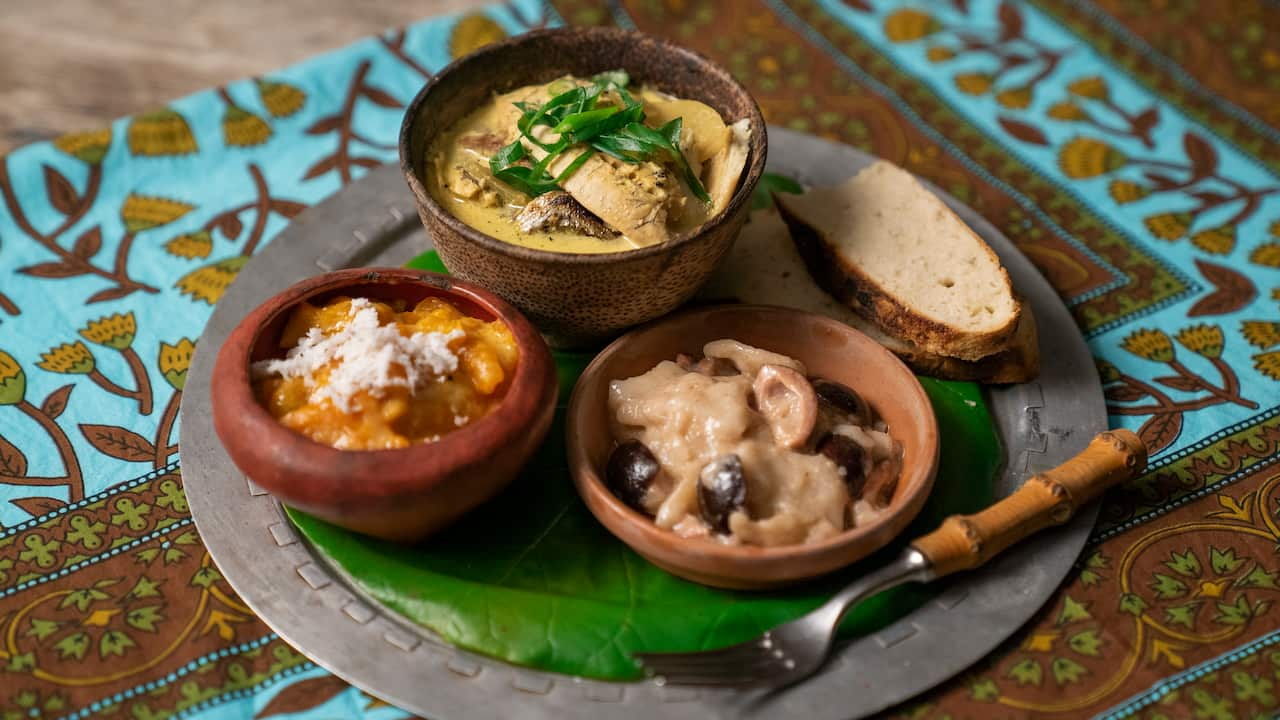Going back to the Northern Peninsula Area [NPA] is always a family affair for Aaron Fa’aoso, almost inescapably so.
“The NPA in general, I'm related to the entire region because of intermarriages,” he says.
“The majority of my family are based up there.”
A recent trip to his hometown of Seisia, while filming the forthcoming season of NITV’s food and travel show Strait to the Plate, was full of reminiscing with relatives and friends over traditional meals.
“A lot of those warm memories came rolling back, because of the food we ate," he tells NITV. "The smells take you back (to) whenever it was, the first time you ate that dish, or when a dish was cooked for a particular ceremony ...
“So yeah it was just walking down memory lane.” Seisia is one of five communities closely gathered at Queensland’s northern tip. It neighbours fellow Torres Strait Islander community Bamaga, as well as Aboriginal communities Umagico, Injinoo and New Mapoon. Aaron says this mixture of independently rich cultures makes the area one of a kind.
Seisia is one of five communities closely gathered at Queensland’s northern tip. It neighbours fellow Torres Strait Islander community Bamaga, as well as Aboriginal communities Umagico, Injinoo and New Mapoon. Aaron says this mixture of independently rich cultures makes the area one of a kind.

Aaron with his Aunty, preparing local "Johnny cakes", to be cooked in sand later. Source: NITV
“The Northern Peninsula is such a unique place, for so many reasons, but especially having those two First Nations cultures side by side.”
His new show brings exactly that to the small screen. By the medium of food, traditional recipes and hometown dishes accompany yarns with family and friends.
Fa’aoso can’t hide his delight when talking about his favourites, like boiled tin meat and deep-fried scones.
“The bully beef and scones! That's heart attack food! But it's just delicious,” he laughs. But the feelings are mixed.
But the feelings are mixed.

Aaron in Northern Peninsula Area at the tip of Cape York. Source: NITV
“It’s brought back a lot of good memories, (but) I also know they've contributed to the bleak rate of chronic diseases prevalent in our community.
“The majority of our people are on welfare, or living on CDP wages, there’s a slim population of the community that are working for local council. So the majority of our people find it extremely difficult to pay for healthier food, and afford a healthier living lifestyle.”
A said the average life expectancy in the Torres and Cape regions is 61 years. It’s a 19-year gap with the state as a whole. A huge part of the problem is the region’s isolation.
“By the time food gets to islands, they are five days old. So the quality of food we're receiving in communities is well below what we are afforded in the cities … then fuel expenses are tacked on to the price of the food. Some of the prices on food shelves are astronomical."
The prohibitive costs are encouraging a push towards more traditional culinary practices.
 “We’re also looking at the trends being revitalised in the Straits for example, is the garden foods, our traditional crops, cassava, sweet potato, yams, which is the healthiest source of carbohydrates.
“We’re also looking at the trends being revitalised in the Straits for example, is the garden foods, our traditional crops, cassava, sweet potato, yams, which is the healthiest source of carbohydrates.

Hand caught fish and garden grown vegetables, part of a move to more traditional, healthy sources of food. Source: Strait to the Plate

Meal on the island of Poruma, Torres Straits. Source: NITV
"I think the more we revert back to our traditional crops and our gardens, the better it will be for us, a more traditional way of living, not only for the environment, but also better for our health.”
Fa’aoso says it’s frustrating that the same issues of economic hardship and poor health outcomes continue to plague his community. While visiting an Aunt and Uncle in his home town, Fa’aoso broke down in tears while discussing the issue of stolen wages.
“We got to inform the wider audience that these policies existed, and were enforced upon our people,” he says.
“We built this country, (but) we weren’t afforded the same opportunities of wealth creation as our non-Indigenous counterparts… These are the issues that are prevalent today and still impact our communities now, and when you go to remote communities, the price of living in these communities is outrageous... In 2021, we’re still asking for the same things that our forefathers did in the 1930s, 1960s, 1970s.”
Conversations like this aren’t the usual fare for cooking shows, but the star says it’s the natural result of breaking bread together. He wouldn’t have it any other way.
“I think what's important about the show is that through the introduction of food, and food is the binding that introduces us to communities, but through these discussions and these yarns you begin to find out what is the beating heart of each community, and which issues are prevalent in each community.”
“I think what's important about the show is that through the introduction of food, and food is the binding that introduces us to communities, but through these discussions and these yarns you begin to find out what is the beating heart of each community, and which issues are prevalent in each community.”
"But yeah, people ask me if I am political, (and) I say everything I do has a political connotation to it ... We’re Blakfullas! It goes hand-in-hand. It's part of the cause. You can’t separate it."
Strait to the Plate premieres Thursday 22 April on NITV









